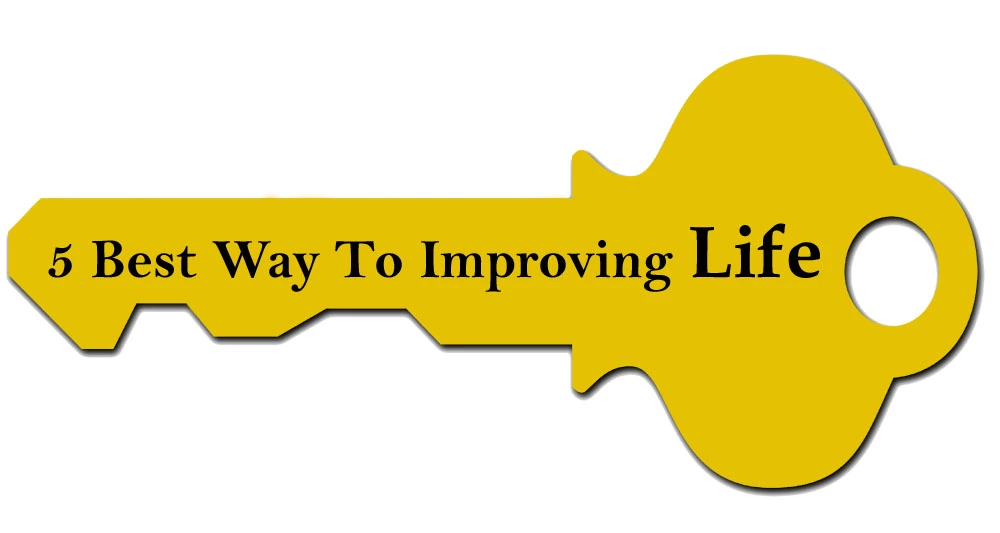Introduction
What it means to improve your life
Making wise decisions that improve your general wellbeing, happiness, and fulfilment constitutes improving your life. This may entail achieving advancements in a number of areas of your life, including your relationships, profession, finances, physical and mental health, and personal growth. It entails making decisions and acting consistently in ways that are compatible with your values, aspirations, and goals. Your life can be made better, which will increase your sense of fulfilment, joy, and purpose.
Why it is important to work on self-improvement
It’s crucial to work on self-improvement since it enables you to develop as a person and lead a more fulfilling life. It assists you in identifying potential problem areas and creating plans to deal with them. You may improve your self-awareness, learn new abilities, and form healthy habits that help you advance both personally and professionally by putting a strong emphasis on self-improvement. Additionally, it can assist you in developing resilience and overcoming life’s ineluctable obstacles. In the end, improving oneself can result in more happiness, success, and a more fulfilling existence.
Part 1: Mindset

The power of positive thinking
Focusing on the good things in life and confronting problems with a positive attitude are examples of positive thinking. It entails developing a constructive internal dialogue and seeing failures and difficulties as chances for development. According to research, thinking positively can significantly influence one’s physical and mental well-being as well as their success in both their personal and professional lives. You may elevate your mood, lessen stress and anxiety, strengthen your relationships, be more productive, and be more creative by adopting a positive mindset. Practise gratitude, reframe negative ideas, visualise achievement, and speak positively to yourself are some methods for developing positive thinking. Utilising the benefits of positive thinking, you can greatly enhance your life.
Cultivating a growth mindset
Adopting a growth mindset is accepting the notion that your skills and intelligence can be improved through effort, perseverance, and commitment. The opposite of this thinking is a fixed mindset, which holds that your skills are fixed and cannot be modified. You can improve your resilience, flexibility, and openness to learning and growth by developing a growth mindset. This can help you be more motivated, perform better, and succeed more in several areas of your life. Embracing challenges as opportunities for growth, seeing failure as a teaching moment, asking for feedback and constructive criticism, and developing a passion for learning are some tactics for developing a growth mindset. You may alter your outlook on life and realise your full potential by cultivating a growth mindset.
Techniques for managing stress and anxiety
Taking control of your stress and anxiety is crucial to enhancing your life. The following are some methods that can be useful:
1. Deep breathing: Practises for deep breathing can help you relax and lessen stress and anxiety. Try inhaling deeply and gently before exhaling.
2. Mindfulness meditation: The practise of mindfulness meditation entails concentrating your attention on the present moment without passing judgement on it. You can achieve a stronger sense of inner serenity and tranquilly by engaging in this practise, which can help you become more conscious of your thoughts and emotions.
3. Exercise: Engaging in regular exercise might help you manage your stress and anxiety. Exercise releases natural mood enhancers called endorphins.
4. Time management: Being overextended and stressed out can be caused by poor time management. Make an effort to prioritise your tasks and plan an effective timetable that includes time for rest and leisure.
5. Cognitive-behavioral therapy (CBT): CBT is a type of treatment that has been shown to be beneficial in treating stress and anxiety. It entails recognising and altering unfavourable mental patterns that fuel stress and worry.
6. Practise of thankfulness: Developing an attitude of gratitude might assist you in turning your attention away from unfavourable emotions and ideas. Consider keeping a gratitude journal by listing three items each day.
7. Limiting your intake of alcohol and caffeine: Both substances can heighten tension and anxiety. Limit the amount of these substances you consume.
By implementing these strategies into your life, you may create stress and anxiety management plans that work, resulting in more tranquilly, wellbeing, and overall life satisfaction.
Part 2: Physical Health

The importance of exercise for physical and mental health
Health, both bodily and mental, depends on exercise. Regular exercise can assist to strengthen the cardiovascular system, lower the chance of developing chronic illnesses like diabetes and obesity, and improve all aspects of physical performance. Exercise can significantly improve mental health by elevating mood, easing anxiety and depressive symptoms, and fostering a higher sense of wellbeing. The following are some particular advantages of exercise for mental health:
1. Stress reduction: Exercise can aid in lowering cortisol levels, which can heighten tension- and anxiety-related symptoms.
2. Self-esteem: Regular exercise can help you feel better about yourself and more confident.
3. Improved sleep: Exercise can assist in regulating the sleep-wake cycle, which improves the quantity and quality of sleep.
4. Enhanced cognitive functioning: Improved memory and focus are only two examples of the cognitive functions that exercise has been found to improve.
5. Reduced depressive symptoms: Exercise can be an effective depression treatment, lowering depressive symptoms and enhancing general quality of life.
Building healthy habits for nutrition and hydration
Building nourishing dietary and hydration routines is essential for general health and wellbeing. Here are some pointers for creating wholesome habits:
1. Plan meals and snacks in advance: Preparing your meals and snacks in advance might help you choose healthier options and prevent impulsive eating.
2. Focus on nutrient-dense foods: Choose foods that are high in nutrients and low in calories, such as fruits, vegetables, whole grains, lean meats, and healthy fats. Concentrate on nutrient-dense foods.
3. Keep hydrated: Water consumption is crucial for good health in general. Aim for 8 to 10 glasses of water a day, minimum.
4. Avoid sugary beverages: Sugary beverages, such as soda and juice, can cause weight gain and raise your chance of developing chronic diseases. Instead, choose unsweetened beverages or water.
5. Practice mindful eating: Eat mindfully by paying attention to your hunger and fullness cues and taking your time to savour and enjoy your food.
6. Avoid skipping meals: Avoid missing meals because it can affect your metabolism and cause you to overeat later in the day. Eat regular, well-balanced meals throughout the day if you can.
7. Keep healthy snacks on hand: Keep healthy snacks on hand. This will help you resist the urge to reach for unhealthy options.
Part 3: Relationships

The importance of social connections
It is impossible to exaggerate the significance of social ties for general health and wellbeing. Humans are social beings, and our body is hardwired to require social connection. Several ways that social connections can affect our health are listed below:
1. Lower chance of developing depression: Social isolation and loneliness are risk factors for depression, while social interactions might operate as a protective factor.
2. Improved physical health: Social relationships have been associated with better physical health outcomes, such as lower blood pressure, less inflammation, and greater immunological function.
3. Enhanced lifespan: Research has shown that strong social links are a predictor of longevity, with individuals who have them living longer than those who are socially isolated.
4. Greater sense of purpose: Social ties can provide people a sense of direction and significance in life. They can also serve as a source of comfort and support when things are tough.
5. Enhanced cognitive functioning: Improvements in social interactions have been linked to improvements in memory and executive functioning, among other cognitive abilities.
6. Improved mental health: A better sense of social support can help people deal with challenging life situations, which can improve mental health by reducing symptoms of stress and worry.
Strategies for improving communication skills
Success in both personal and professional relationships depends on having strong communication abilities. The following tips will help you communicate more effectively:
1. Active listening: Active listening is one of the most crucial components of good communication. This entails paying close attention to the speaker, clarifying your comprehension with questions, and summarising what you have heard.
2. Nonverbal communication: Body language and voice tonality are examples of nonverbal communication that can express as much meaning as words. Pay attention to both your own and the other person’s nonverbal cues when conversing.
3. Clear and concise language: Avoid using jargon or other technical terms that the audience can find incomprehensible when speaking by utilising plain, succinct English.
4. Empathy: Make an effort to comprehend the viewpoint of the other person and speak in a way that demonstrates empathy and understanding.
5. Assertiveness: Being assertive entails communicating your demands and desires in a straightforward manner while also respecting those of the other person.
6. Practise: Practising will help you become better at communicating. Look for chances to practise your communication abilities, such as speaking in front of an audience or taking part in group conversations.
7. Feedback: Ask for opinions on your communication abilities from others, and be receptive to helpful criticism.
You may strengthen your capacity to connect with others, create stronger connections, and have more success in both your personal and professional life by implementing these techniques into your communication style.
Part 4: Career

The importance of finding meaningful work
Finding fulfilling work is crucial for overall wellbeing and life pleasure. Here are a few explanations:
1. Sense of purpose: Work that is meaningful gives people a sense of direction and purpose in life. We can feel fulfilled and satisfied when we believe we are contributing in a meaningful way.
2. Increased motivation: We are more likely to be motivated and involved in our work when we believe our jobs to be important. This may result in increased output and improved work quality.
3. Improved mental health: A sense of purpose and fulfilment in our work can help us achieve better mental health outcomes, which include less stress and anxiety.
4. Greater job satisfaction: When we are content with the work we do, we are less likely to become burned out or feel job dissatisfaction.
5. Improved connections: Because it can give us a sense of connection and shared purpose with our coworkers, meaningful work has the potential to enhance our relationships with others.
6. Increased creativity: When we are working on projects that are meaningful to us, we are more likely to address problems in creative and original ways.
Strategies for career advancement
A crucial component of professional development and growth is career advancement. The following are some tips for developing your career:
1. Set goals: Decide what you want out of your work and make a plan to get there. This can keep you motivated and focused while also providing a clear path for job progress.
2. Learn new skills: By taking advantage of possibilities for professional growth, education, and training, you should constantly advance your knowledge and abilities. You may be able to maintain your competitiveness and grow in worth to your employer as a result.
3. Find feedback: To determine areas for improvement and chances for growth, seek feedback from your coworkers, managers, and mentors.
4. Network: Build a strong professional network by participating in industry events, signing up for trade organisations, and getting in touch with coworkers on social media sites like LinkedIn.
5. Attempt new endeavours: Look for chances to add more tasks and responsibilities to your existing position or look for new employment that will help you advance and learn new skills.
6. Build relationships: Develop solid connections with coworkers and mentors who can support, counsel, and direct you throughout your career.
7. Describe your objectives: Be clear about your professional aspirations and let your boss and coworkers know what they are. By doing this, you can find possibilities for growth and make sure that your efforts are directed towards the right objectives.
Tips for achieving work-life balance
Maintaining overall wellbeing and preventing burnout require finding work-life balance. Here are some recommendations for striking a good work-life balance:
1. Set limits: Draw distinct lines separating work time and leisure time. This can involve establishing particular working hours, refraining from accessing business emails after certain hours, and taking breaks to recharge throughout the day.
2. Prioritize self-care: Set self-care as a priority by scheduling time for enjoyable hobbies, exercise, and meditation. You can do this to lessen stress and raise your mood in general.
3. Be present: Be present by concentrating on your tasks while at work. Concentrate on your own life at home. Avoid trying to accomplish two things at once or multitasking since this might reduce productivity and raise stress levels.
4. Learn to say no: Say no to new projects or commitments if you’re feeling overloaded so that you may maintain a healthy work-life balance.
5. Seek assistance: If you require assistance, speak with coworkers, friends, or family members. Speaking with others can aid in stress management and the discovery of fresh approaches to problems.
6. Be adaptable: Recognise that achieving work-life balance may call for some pragmatism and adaptation. Be willing to adjust your schedule or workplace to more effectively accommodate your personal life.
You may improve your work-life balance and general wellbeing by using these suggestions. Keep in mind that finding balance is a continual process that may require constant effort and modification over time.
Part 5: Finances

The importance of financial stability
A key component of overall wellbeing is financial stability, which can have a big impact on how we live our daily lives. Here are some justifications for the significance of financial stability:
1. Reduces Anxiety: Financial stability can aid in lowering anxiety and stress caused by money worries. This may result in enhanced mental health and general quality of life.
2. Ensures security: Having a steady income and a strong financial base can give one a feeling of safety and tranquilly.
3. Allows for long-term planning: Long-term planning is made possible by financial stability, which enables people to make long-term plans like saving for retirement, buying a home, or paying for their children’s education.
4. Enhances decision-making: People who are financially secure are better equipped to make well-informed financial judgements and steer clear of rash or dangerous actions.
5. Enables giving back: Financial stability can give people the ability to give back to their communities through volunteering or making charitable contributions.
6. Goal-achieving: Financial stability can make it simpler for people to accomplish their objectives, including starting a business, going on a trip, or taking up a new interest.
You can benefit from the various advantages that come with financial security by placing a priority on financial stability and taking actions to enhance your financial well-being. Making a budget, setting aside money for future needs and objectives, paying off debt, and investing are a few examples of how to do this.
Strategies for budgeting and saving
Individuals can achieve financial stability and accomplish their financial goals by using efficient budgeting and saving techniques. Following are some budgeting and saving techniques:
1. Track your expenses: To understand where your money is going, start by keeping track of your outgoing costs. This might show you where you can save money and make sacrifices.
2. Make a budget: After you have a firm grasp on your costs, make a budget that details your income and costs. Make sure to set aside money for savings and discretionary spending, as well as for necessities like housing, food, and transportation.
3. Set financial goals: Set financial objectives Determine your financial objectives, such as debt repayment or home down payment savings. Make use of these objectives to drive your saving and budgeting efforts.
4. Automate saving: To develop the habit of saving regularly, set up automatic transfers from your checking account to a savings account.
5. Spend less: Look for ways to save money, such cutting out on eating out or subscription services. Think about haggling over prices or switching to less expensive options.
6. Create a reserve fund: Set aside money for unforeseen expenses like medical or auto repairs. Aim to save three to six months’ worth of spending for a rainy day.
7. Think about investing: Over time, investing can help your money increase. To find investing solutions that suit your financial objectives, think about seeing a financial counsellor.
Tips for investing and growing wealth
Investing can be a successful long-term wealth-building strategy. The following advice can help you invest and build wealth:
1. Start early: Your money has more time to grow the earlier you start investing. As soon as you can, think about starting a retirement account, like an IRA or 401(k).
2. Diversify your portfolio: By spreading your investments over a variety of assets, including stocks, bonds, and real estate, diversification can assist to lower risk.
3. Consider your risk tolerance: Assess your level of risk tolerance and make investments in accordance. Investments with a higher risk level typically have the potential for larger rewards but also include more risk.
4. Consistently invest: To benefit from dollar-cost averaging and lessen the impact of market swings, invest a predetermined sum of money on a regular basis, such as monthly or quarterly.
5. Avoid emotional decisions: Refrain from making investment decisions out of fear or greed. Don’t try to time the market; instead, stick to your investing plan.
6. Think about engaging with a financial advisor: They can offer you individualised investing guidance and assist you in creating a long-term investment strategy.
7. Be patient: Investing is a long-term plan, so have patience. Avoid the temptation to trade frequently or to seek for quick gains.
Part 6: Personal Development

The importance of continued learning
Continuous learning is essential for both professional and personal development. Here are a few explanations:
1. Keeps the mind sharp: Learning new things helps keep the mind busy and engaged, which can stop cognitive decline as we age and keep our minds sharp.
2. Boosts self-esteem and confidence: Acquiring new skills and information can boost one’s self-confidence.
3. Improves career prospects: Continual education can enhance career possibilities by giving learners new abilities and information that may result in raises or new employment opportunities.
4. Enhances hobbies and personal interests: Learning can also increase hobbies and personal interests, making life more full and enjoyable.
5. Keeps up with changing times: Constant learning is necessary to stay current with new technologies, trends, and advancements in a variety of sectors in today’s world of rapid change.
Techniques for building self-confidence
Constant learning is necessary to stay current with new technologies, trends, and advancements in a variety of sectors in today’s world of rapid change.
1. Identify your strengths: Make a list of your accomplishments and strengths to help you identify your strengths. Putting your attention on your assets can help you feel more confident.
2. Self-care is important: Taking care of yourself by getting adequate sleep, exercising, and eating a good diet will make you feel more energised and confident.
3. Challenge negative self-talk: Recognise your negative self-talk and combat it with affirmations that are positive. Instead of stating, “I can’t do this,” say, “I can do this, and I will do my best.”
4. Set achievable goals: Set ambitious yet attainable objectives. Setting and achieving objectives can boost one’s self-esteem and sense of accomplishment.
5. Develop new skills: Acquiring new abilities can boost one’s self-esteem and sense of accomplishment. Attend a workshop or class to learn something new.
6. Take risks: Taking chances and stepping outside of your comfort zone can help you gain confidence. Start out cautiously and gradually increase to greater dangers.
Keep in mind that developing self-confidence is a process that requires time and repetition. As you work to increase your self-confidence, be patient and kind to yourself. Celebrate all of your accomplishments, no matter how minor, and draw lessons from your errors.


























+ There are no comments
Add yours